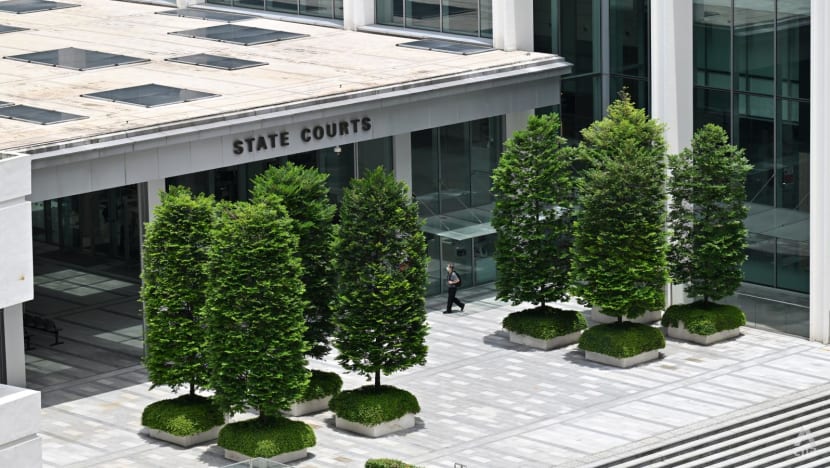Mother and son charged with lying to IRAS over 99-to-1 property purchase in first such prosecution
Tan Kai Wen Keith, 26, had purchased a condominium unit at The Watergardens at Canberra before selling a 1 per cent share to his mother Ng Chiew Yen - a move IRAS suspects was meant to avoid tax.

File photo of the State Courts of Singapore. (File photo: CNA/Jeremy Long)

This audio is generated by an AI tool.
SINGAPORE: A mother and her son were charged on Friday (Sep 20) with lying to the tax authority over a "99-to-1" property purchase arrangement that some use to avoid additional buyer's stamp duty (ABSD).
It is the first such prosecution, which comes amid an audit by the Inland Revenue Authority of Singapore (IRAS) into two-step 99-to-1 property transactions.
Tan Kai Wen Keith, 26, had bought a condominium unit in his name before selling a 1 per cent share to his mother, 56-year-old Ng Chiew Yen.
This two-step transaction enables one party who already owns another property to avoid paying additional taxes while still being eligible to jointly apply for a home loan.
By structuring the transaction this way, ABSD is payable only on the 1 per cent share of the property, rather than the full value of the property if the purchase was done jointly at the outset.
IRAS suspects the transaction between Tan and his mother was arranged to avoid ABSD.
Charge sheets state that the property he bought is located at 49 Canberra Drive - the address of an upcoming development The Watergardens at Canberra. Units there are priced at S$1.19 million to S$2.87 million, according to listings on PropertyGuru.
How does the "99-to-1" scheme work?
As its name suggests, the arrangement involves one buyer owning 99 per cent of a property while the other holds a 1 per cent share.
This is not illegal, but when the 99-to-1 home ownership ratio is used to avoid additional buyer's stamp duty (ABSD), it becomes an issue.
Take for instance Singaporeans Mr A and Ms B, who jointly buy a S$1 million home. Mr A already owns another property and would therefore have to pay an ABSD of 20 per cent, or S$200,000, on the new property.
If the 99-to-1 intention is declared at the outset, the 20 per cent ABSD is payable as long as one party is an existing property owner.
However, some buyers try to get around the ABSD by entering a two-step 99-to-1 arrangement.
This involves individuals without any prior properties buying homes 100 per cent in their name initially, then selling a small share of it - 1 per cent - to another person who already has another property and therefore has a higher ABSD profile. The share transfer typically occurs within a very short period of time.
In the case of Mr A and Ms B, if Mr A buys over a 1 per cent share, his share of the S$1 million property is S$10,000. Therefore, he has to pay an ABSD of 20 per cent of S$10,000 – that is, S$2,000.
This two-step transaction enables Mr A to avoid paying additional taxes while still being able to jointly apply for a home loan with Ms B.
While 99-to-1 transactions are not new, the issue became a talking point in April 2023 when authorities said that IRAS had initiated audits, after detecting a small but rising number of such arrangements in recent years.
It also comes amid a backdrop of rising ABSD as part of property cooling measures.
Since Apr 27, 2023, Singaporeans must pay 20 per cent in ABSD, up from 17 per cent, when purchasing a second property, and 30 per cent on subsequent purchases.
Those figures are higher for permanent residents and foreigners.
THE CASE
The Singaporean pair charged on Friday received five charges each under the Stamp Duties Act for conspiring to provide misleading information to IRAS.
Tan purchased the residential property in his name on Sep 24, 2021, and subsequently sold a 1 per cent share to his mother.
In 2023, IRAS began auditing the related transactions and sought information from Tan via email.
When asked why he did not jointly purchase the property with his mother at the outset, Tan allegedly said that he had made a hasty decision to buy the property, with the understanding that his family would support him financially.
He is also accused of lying that his family was unable to do so and that he had to add his mother as a joint owner to take a loan.
Tan is also accused of providing misleading information to IRAS in the form of incomplete WhatsApp messages.
Neither Tan nor his mother have indicated how they would plead. They will return to court in October.
If convicted of providing false and misleading information to IRAS, Tan and Ng could be jailed for up to two years, fined up to S$10,000, or both.
IRAS said it will recover the rightful amount of stamp duty from buyers if it discovers tax avoidance. A surcharge of 50 per cent of the additional duty payable can be imposed, and there is no statutory time limit for stamp duty audits.
Purchasers who entered into a two-step 99-to-1 property purchase arrangements should voluntarily disclose their arrangements to IRAS, the taxman said.
"Depending on the circumstances, IRAS is prepared to consider such cases more favourably," the agency added.
Finance Minister Lawrence Wong said in May that IRAS had found 166 cases involving tax avoidance in its review of 187 such 99-to-1 cases, adding that about S$60 million in ABSD and surcharges will be clawed back.














